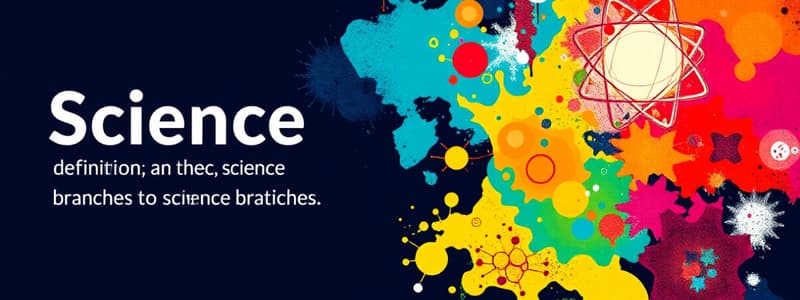Podcast
Questions and Answers
What is a key characteristic of scientific knowledge?
What is a key characteristic of scientific knowledge?
- It is based on untested theories. (correct)
- It is often based on personal beliefs.
- It is always subjective.
- It must be able to be proven wrong. (correct)
Which branch of science studies matter, energy, and their interactions?
Which branch of science studies matter, energy, and their interactions?
- Biology
- Psychology
- Physics (correct)
- Chemistry
Which step in the scientific method involves evaluating data and results?
Which step in the scientific method involves evaluating data and results?
- Replication
- Hypothesis
- Observation
- Analysis (correct)
What is a purpose of the scientific method?
What is a purpose of the scientific method?
What type of science focuses on the production, distribution, and consumption of goods and services?
What type of science focuses on the production, distribution, and consumption of goods and services?
Which of the following is NOT a characteristic of scientific knowledge?
Which of the following is NOT a characteristic of scientific knowledge?
Which profession applies scientific principles specifically to health and disease?
Which profession applies scientific principles specifically to health and disease?
What is a current trend in science related to collaboration?
What is a current trend in science related to collaboration?
Flashcards are hidden until you start studying
Study Notes
Definition of Science
- Systematic study of the structure and behavior of the physical and natural world.
- Based on observation, experimentation, and evidence.
Key Branches of Science
-
Natural Sciences
- Physics: Study of matter, energy, and their interactions.
- Chemistry: Study of substances, their properties, and reactions.
- Biology: Study of living organisms and life processes.
-
Formal Sciences
- Mathematics: Study of numbers, quantities, shapes, and patterns.
- Logic: Study of reasoning and argumentation.
-
Social Sciences
- Psychology: Study of mind and behavior.
- Sociology: Study of society and social behavior.
- Economics: Study of the production, distribution, and consumption of goods and services.
-
Applied Sciences
- Engineering: Application of scientific principles to design and build structures or systems.
- Medicine: Application of biology and other sciences to health and disease.
Scientific Method
- Observation: Identifying a phenomenon or problem.
- Hypothesis: Formulating a testable explanation.
- Experimentation: Conducting controlled tests to validate the hypothesis.
- Analysis: Evaluating data and results.
- Conclusion: Drawing insights from the data, confirming or rejecting the hypothesis.
- Replication: Repeating the experiments to ensure reliability and validity.
Importance of Science
- Enhances understanding of the universe and natural phenomena.
- Drives technological innovation and development.
- Provides solutions to global challenges (e.g., climate change, health issues).
- Promotes critical thinking and problem-solving skills.
Characteristics of Scientific Knowledge
- Empirical: Based on observable evidence.
- Testable: Can be confirmed through experimentation.
- Repeatable: Results should be consistent when experiments are replicated.
- Falsifiable: Must be able to be proven wrong to be scientifically valid.
Careers in Science
- Research Scientist: Conducts experiments and studies.
- Environmental Scientist: Focuses on environmental protection and sustainability.
- Healthcare Professional: Works in medicine, nursing, or public health.
- Data Analyst: Analyzes data to support scientific research and decision-making.
Current Trends in Science
- Interdisciplinary research: Collaboration across different scientific fields.
- Use of technology: Advancements in data collection and analysis (e.g., AI, machine learning).
- Focus on sustainability: Research aimed at addressing environmental and ecological concerns.
Definition of Science
- Science is a systematic study focusing on the structure and behavior of the physical and natural world.
- Relies on observation, experimentation, and the accumulation of evidence.
Key Branches of Science
- Natural Sciences encompass:
- Physics: Investigates matter, energy, and their interactions.
- Chemistry: Explores substances, their properties, and chemical reactions.
- Biology: Examines living organisms and life processes.
- Formal Sciences include:
- Mathematics: Studies numbers, quantities, shapes, and patterns.
- Logic: Analyzes reasoning and argumentation.
- Social Sciences address:
- Psychology: Focuses on mind and behavior.
- Sociology: Investigates society and social interactions.
- Economics: Studies the production, distribution, and consumption of goods and services.
- Applied Sciences involve:
- Engineering: Applies scientific principles for designing and constructing structures or systems.
- Medicine: Utilizes biology and other sciences to address health and disease.
Scientific Method
- Observation: Starts with identifying a phenomenon or problem.
- Hypothesis: Develops a testable explanation for the observed phenomenon.
- Experimentation: Conducts controlled tests to evaluate the hypothesis.
- Analysis: Involves interpreting the data and results from the experimentation phase.
- Conclusion: Insights are drawn to confirm or refute the hypothesis.
- Replication: Repeats experiments to verify the reliability and validity of findings.
Importance of Science
- Deepens understanding of the universe and natural phenomena.
- Fuels technological advancements and innovation.
- Provides solutions to global issues such as climate change and health challenges.
- Cultivates critical thinking and problem-solving abilities.
Characteristics of Scientific Knowledge
- Empirical: Rooted in observable evidence.
- Testable: Must be verifiable through experimentation.
- Repeatable: Results should be consistent when experiments are duplicated.
- Falsifiable: Theories must be capable of being disproven.
Careers in Science
- Research Scientist: Conducts experiments and studies to advance knowledge.
- Environmental Scientist: Aims at environmental protection and sustainable practices.
- Healthcare Professional: Engages in various fields of medicine and public health.
- Data Analyst: Interprets data to support scientific research and informed decision-making.
Current Trends in Science
- Emphasizes interdisciplinary research, encouraging collaboration across scientific areas.
- Advances in technology enhance data collection and analysis, including artificial intelligence and machine learning.
- A strong focus on sustainability addresses pressing environmental and ecological issues.
Studying That Suits You
Use AI to generate personalized quizzes and flashcards to suit your learning preferences.




